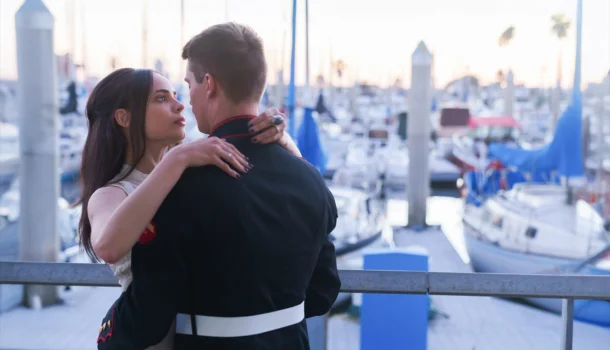Few recent films have managed to capture, with such emotional tension and simmering conflict, the unease of a generation trying to love in an ideologically fractured country. When I first watched this title at its release, I didn’t imagine that its scenes, performances, and subtexts would haunt me with such persistence. Only now, with the necessary distance, do I revisit this narrative with less infatuation — but perhaps with more clarity. Placing two protagonists on opposing ends of a political and emotional minefield could have easily fallen into formulaic entertainment. Yet the way Nicolas Galitzine and Sofia Carson stretch this equation transforms what might have been predictable into something deeply visceral. It’s not just their chemistry that sustains the film, but the way they render believable a bond born of cynicism and shaped by survival — one that dares, against all odds, to become real.
The clash between these two worlds — hers, marked by precarity, chronic illness, and activism; his, disciplined, militarized, burdened by debt and unresolved pain — reveals something deeper than a simplistic left-versus-right dynamic. What unfolds is the confrontation of two forms of abandonment: institutional, which pushed her to the margins, and emotional, which pushed him toward war. In one another, they find not only a possible escape, but also a disquieting mirror. The marriage pact they form, steeped in urgency and artifice, is less about romance and more about a desperate attempt to regain some control over their bodies and fates. There is no naivety in this arrangement. There is calculation, fear, and a frantic need to avoid collapse.
It is in this context that Cassie, Carson’s character, stands out — not merely for her bravery or burdens, but for the clarity with which she sees the perverse logic of a system that criminalizes poverty and monetizes survival. Her medical condition — dependence on insulin — is not just a plot detail but a political marker that cannot be ignored. Illness here is not the obstacle; it is the constant reminder that, in a wealthy nation, to fall sick without money can be a death sentence. Meanwhile, Luke — played with restrained intensity by Galitzine — is far from a flat military stereotype. He lives in tension between a desire to uphold rigid moral codes and the crumbling reality of his own self-destruction, born of choices no one ever taught him how to make.
The narrative does not settle for romanticizing the conflict. On the contrary, it places the characters in a continual ethical dilemma: can the legitimacy of their feelings survive the fact that everything began as a fraudulent arrangement? More provocatively: is it possible to love someone whose worldview directly threatens your own existence? The film offers no simple or comforting answers. What begins as a cynical performance — staged for suspicious military authorities and skeptical family members — gradually exposes cracks in their emotional armor. They draw closer not through similarity, but through shared fracture. And it is precisely here that the story becomes compelling: not when it tries to persuade the viewer of the love’s authenticity, but when it boldly exposes love, in this case, as an act of defiance.
The screenplay, adapted from Tess Wakefield’s novel, wisely avoids framing the relationship as a redemptive fable. Instead, what emerges is a coexistence fraught with daily friction, awkward adjustments, and a constant fear that it could all unravel at the slightest misstep. Luke’s deployment, which separates him from Cassie shortly after their initial closeness, is not just a plot device — it is a harsh reminder that war, both literal and emotional, does not take leave. While he faces external threats, she channels her turmoil into music, gradually discovering a voice that may have always been there, stifled by the fear of having no choices.
Even as fame begins to knock, the story resists escapism. Cassie’s rise as a singer is not a reward, but a new battleground. After so many battles, how can a woman allow herself success without guilt? And what becomes of a bond born of desperation when the winds finally seem to shift? The answer does not come as a neat resolution, but as a quiet shift: love, in this narrative, is not what saves — but what remains after nearly everything else has been lost.
Finally, “Purple Hearts” makes a crucial decision by refusing to dismiss the protagonists’ ideological differences as trivial. These remain — persistent, uncomfortable, like a fracture running through the fabric of their daily life. What brings them together is not a denial of these divisions, but a mutual recognition that, in a country where love is constantly filtered through political identity, to love might be the most subversive act of all.
Film: Purple Hearts
Director: Elizabeth Allen Rosenbaum
Year: 2022
Genres: Romance/Drama/Music
Rating: 9/10

